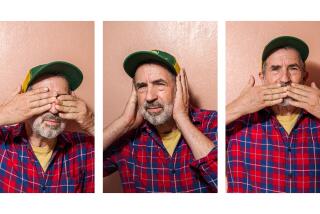‘The Zookeeper’s Wife,’ a Holocaust movie for a new — and feminist — age
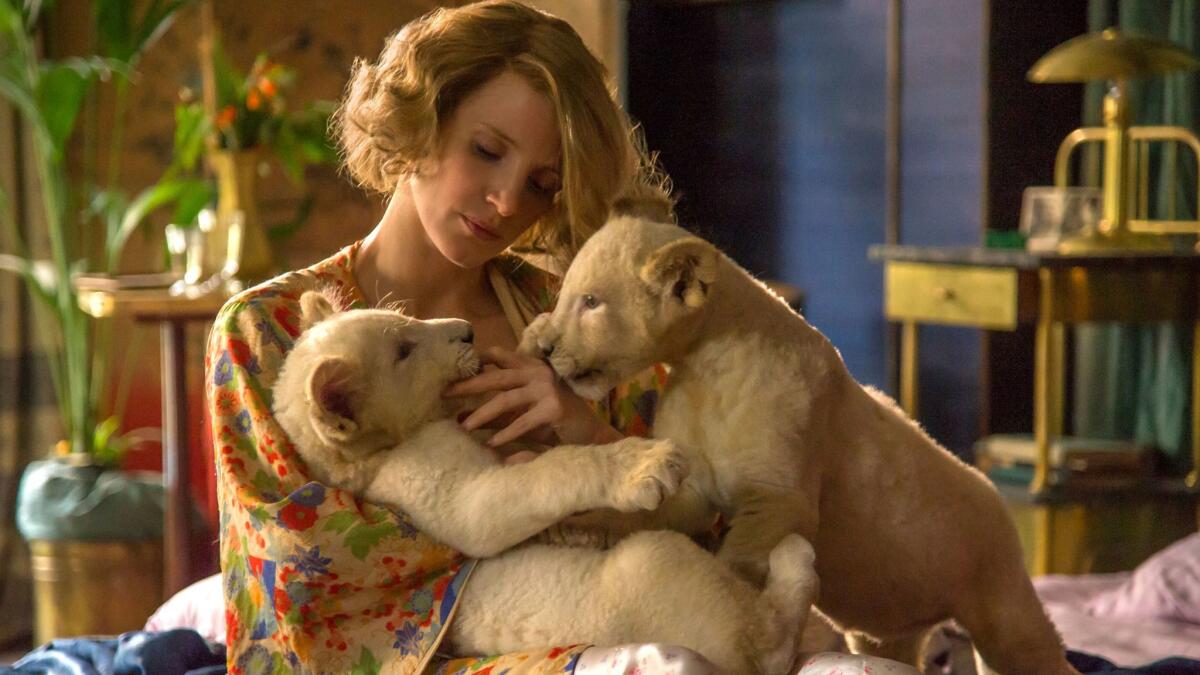
Reporting from NEW YORK — Stories about Gentile saviors of European Jews during the Holocaust have been a staple of international cinema for decades, whether it’s “Schindler’s List,” Agnieszka Holland’s subterranean “In Darkness,” Richard Chamberlain’s 1980s TV movie “Wallenberg” or the most ambiguous of the bunch, the 2015 foreign-language Oscar-winner “Ida.”
But none of those movies has focused on the many women who risked their lives to help victims of Hitler’s Third Reich. Women were, after all, instrumental in these efforts, sufficiently under the radar of a male-driven military culture to pull off acts of great heroism.
“In the past we’ve associated being brave and strong and powerful as masculine qualities,” says actress Jessica Chastain. “But not all heroes have to use violence as a weapon. In fact, it can take greater courage to fight something without a weapon.”
That’s both premise and raison d’etre of Chastain’s new movie, “The Zookeeper’s Wife.” Directed by Niki Caro from Diane Ackerman’s 2007 bestseller, the film tells the true story of Antonina Żabińska and her husband, Jan, proprietors of the Warsaw Zoo who risked their lives to save 300 Jews from the city’s infamous ghetto.
War in the movies is so often about men. There’s never been one about the role someone played in history from a feminist point of view.
— “The Zookeeper’s Wife” director Niki Caro
A director of movies about on-the-margins feminist heroines such as “Whale Rider” and “North Country,” Caro believed that the canon cried out for Antonina’s story.
“There are very incredible films about this period of time. But war in the movies is so often about men. There’s never been one about the role someone played in history from a feminist point of view,” says the New Zealand director as she sits next to Chastain in a midtown restaurant on a recent evening.
The actress had just come from an appearance on “The Tonight Show Starring Jimmy Fallon,” where a good-spirited round of charades would, she hoped, help sell the movie to a Middle American audience.
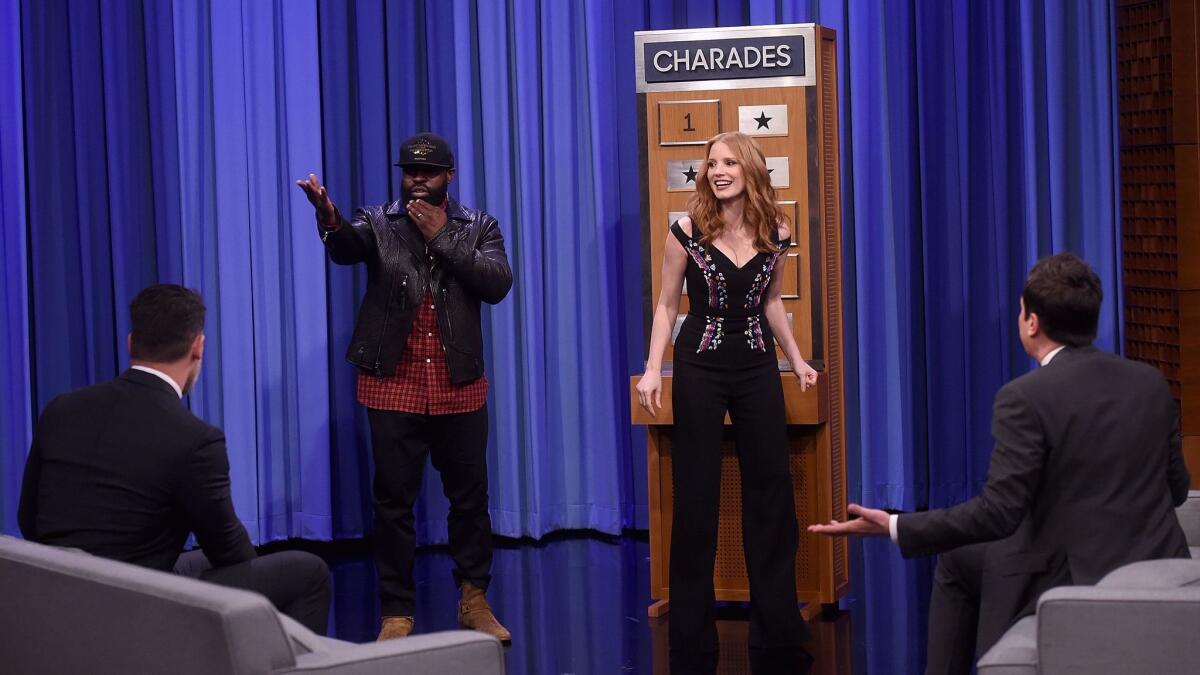
Also believing in that populist potential: Focus Features, which released the movie wide this weekend with the belief that an animal-centric story that avoids showing some of World War II’s grimmer horrors could accrue mass appeal.
The story begins as Antonina refuses to leave her beloved zoo with young son Ryszard even as the Nazi invasion of Poland looms. The brutal bombing soon destroys the zoo, and the Nazis occupy Warsaw, rounding up Jews to the ghetto. Antonina and her husband devise a plan — under the nose of a Nazi zoologist (Daniel Bruhl) — to start a smuggling operation that will bring the Jews to safety. (It cleverly involves a pig farm on the grounds of the now occupied zoo.)
Soon the refugees are living in an underground bunker, where they hope to eventually find safe passage out of the occupied country and avoid the gas chambers that is the fate of so many in the ghetto.
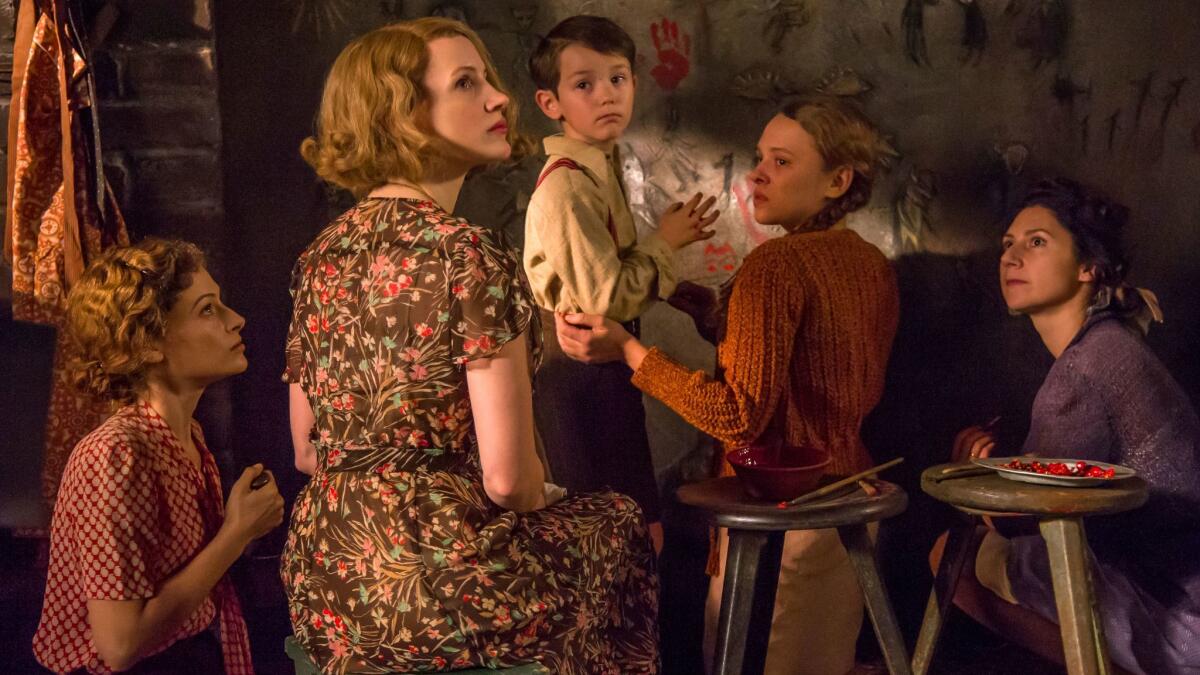
In the past we’ve associated being brave and strong and powerful as masculine qualities.
— Jessica Chastain
While Jan joins the resistance, Antonina devises the plan and then executes it, her sensitivities allowing people at home to feel comfortable while her sexuality is wielded in a more modern feminist manner to keep Bruhl’s prying eyes at bay,
“Antonina redefines what it means to be a hero,” says Chastain.
At the end of the movie her character gives birth to a second child, a daughter, Teresa. The real-life daughter would go on to grow up at the zoo — which her parents continued to operate after the war — where she was taught the remarkable history.
“Nobody had to tell me these stories because many of the so-called guests of the villa were still living with us after the war,” says Teresa Żabińska, speaking via a translator from Poland this week. “It was all around me.”
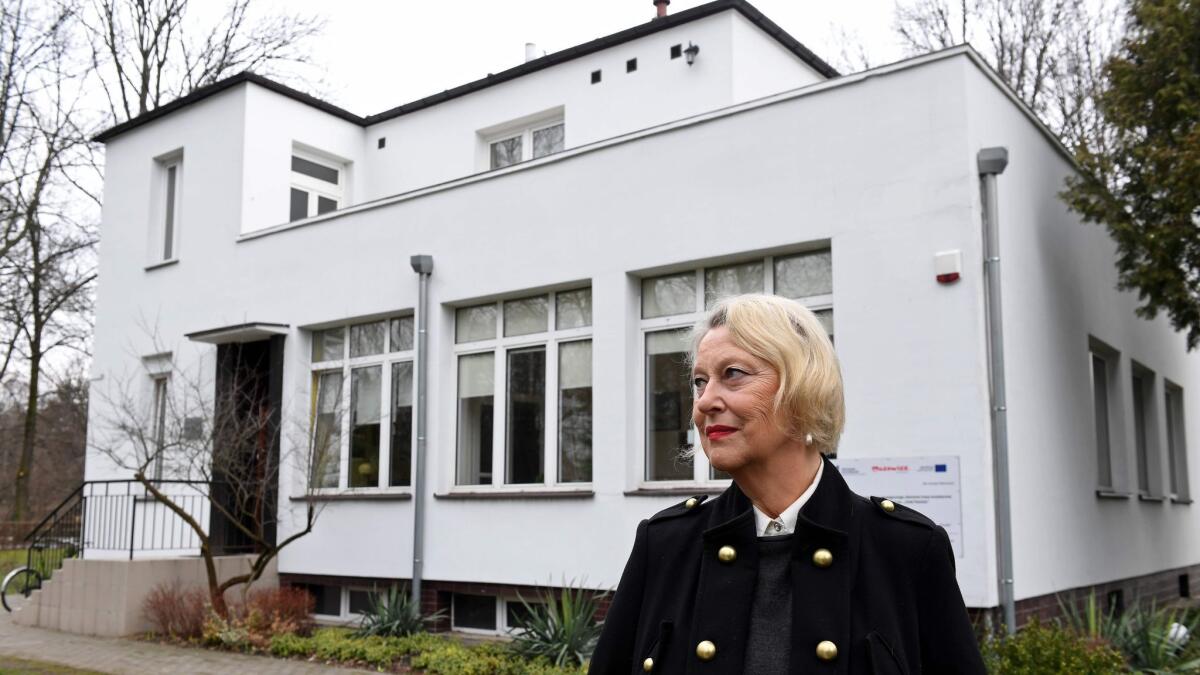
The younger Żabińska met with Chastain before shooting began and also visited the Prague set, where she had a small part as well. “I’m very happy my parents are memorialized in this way,” she adds. “There’s a love and a sense of humanitarian values in the film that I hope people will take from it.”
The movie was shot in Prague because Warsaw was leveled during the war beyond the point where it could represent the events of the movie. The zoo, however, remains.
The connection between animal compassion and human rescue is made strongly in the film. The same principles that have Antonina assuaging a distressed elephant inform her desire, when the stakes are raised, to embrace risk in the name of saving people.
It’s the rare Holocaust movie that puts animals as central characters. Chastain and Caro in the interview are eager to emphasize the connections between helpless creatures of all sorts (nearly all those used in the shoot were real for this reason), as well as their thoughtfulness in dealing with the animals on set. Chastain says she was simply playing with the creatures instead of trying to induce them to any action; even the sight in the film of them as scared, as they inevitably must be during the invasion, was the result of an incidental reaction captured on camera rather than a staged shoot.
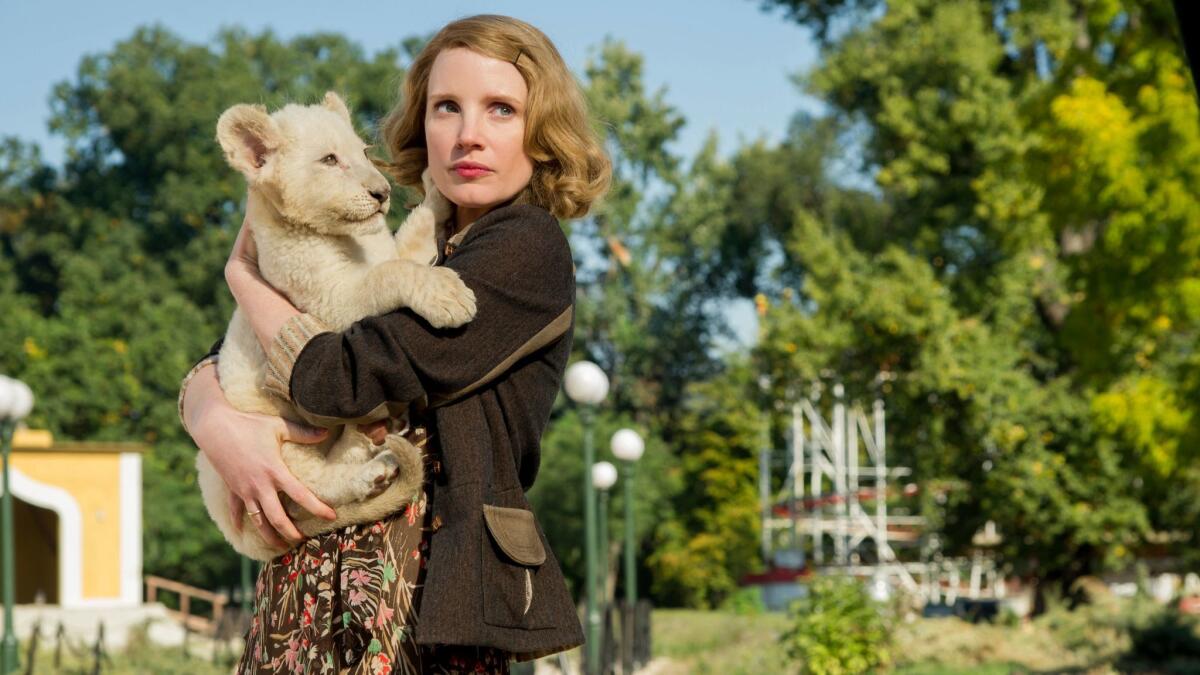
Anne Frank is required reading in school, but it’s such a betrayal when they teach the book and don’t tell us that we in America turned her family away,
— Jessica Chastain
In a happier moment before the war, a young camel gallops along behind Antonina’s bicycle. Chastain says the camel was simply running to see its mother, just out of frame, and she had to pedal to time her movement with the camel instead of the other way around.
Naysayers have lamented that the movie sanitizes the difficult moments of the film to center on the beauty; indeed, what the ghetto occupants were being saved from is, in most scenes, suggested only obliquely. The film is a counterpoint of sorts to the 2016 Oscar winner “Son of Saul,” which confronted those realities head-on.
But Caro says that to focus on what isn’t there is to miss the point.
“It’s a point of difference with this film,” she says. “We’re talking about healing and humanity, which takes a certain confidence and courage. We’re telling a story of warmth and love, set in a zoo.”
When I came aboard people weren’t talking about refugees. I couldn’t imagine that reading the newspapers would be parallel to what was happening in the 1930s.
— Jessica Chastain
Chastain also argues against the cultural eye-roll that has at times accompanied the release of new Holocaust movies, particularly during Oscar voting — the idea that there are “too many” of the form. She says such a reaction is troubling, an implied quota that comes with subtle bigotry.
If anything, she says, there have been gaps in the pantheon, particularly when it comes to the subject of American complicity.
“Anne Frank is required reading in school, but it’s such a betrayal when they teach the book and don’t tell us that we in America turned her family away,” she says. “I can’t believe I was never taught that. It feels like such a failure of the U.S. educational system.”
That inevitably raises the modern resonance of “Zookeeper’s Wife,” particularly the question of sanctuary for those fleeing slaughter. The film, of course, remains firmly in period. But in person the principals are willing to make the connection.
“When I came aboard [in 2010] people weren’t talking about refugees. I couldn’t imagine back then that reading the newspapers would be parallel to what was happening in the 1930s,” says Caro. “And when we shot [in 2015] the migrant crisis was all around us.
“But I can’t help seeing new relevance today,’ she continues. “It should be considered right now, where paranoia leads to fear and then, logically, to hatred.
“We don’t talk about decency much anymore,” she adds.
Chastain says that she wouldn’t even restrict the parallels to the current moment.
“This is a story about the present — and the future,” she says. “Antonina wasn’t a celebrity or a politician; she didn’t have a huge social-media following. She was an ordinary person driven to action. You can feel angry or hopeless about politics. And I think people have to move away from that. I think the biggest lesson Antonina taught is that compassion and protecting the lives of others is contagious.”
Sign up for our weekly Indie Focus newsletter »
Twitter: @ZeitchikLAT
ALSO
Review: Niki Caro and Jessica Chastain create an emotionally satisfying ‘Zookeeper’s Wife’
Niki Caro to helm live-action ‘Mulan’ movie
Heady days for Jessica Chastain as ‘The Martian’ and ‘Crimson Peak’ loom
More to Read
Only good movies
Get the Indie Focus newsletter, Mark Olsen's weekly guide to the world of cinema.
You may occasionally receive promotional content from the Los Angeles Times.

